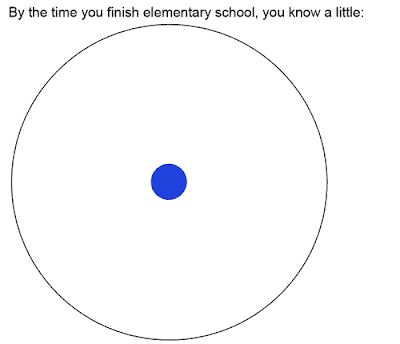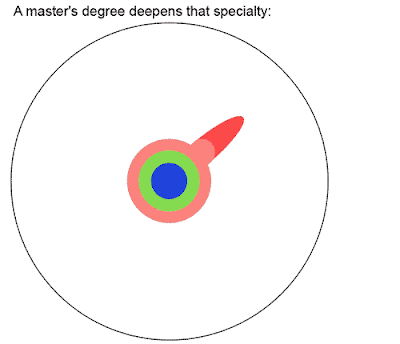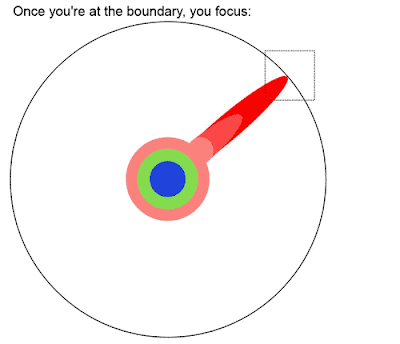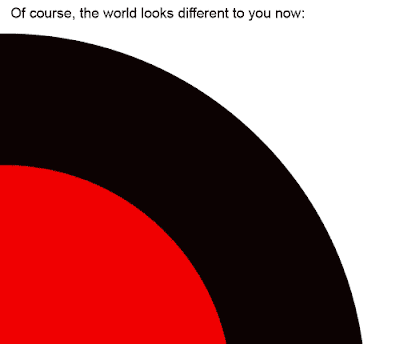What is Ph.D.? Yes I know it is a prestigious academic degree. Only that? Hmm... I think NO. It's hard to describe it in words. You better focus on the illustration below:
And... the things that made me fall silent is what was said by Matt, below:
"If you zoom in on the boundary of human knowledge in the direction of genetics, there's something just outside humanity's reach. My wife and I chose to start funding these graduate students after we learned that our son has a rare, fatal genetic disorder. It may be too late for my son, but it's not too late for other children. Even one child suffering is one child too many. The only way to end this kind of suffering is science. And, the best way to do science is through graduate students."
What a beautiful thought that touched my heart.
Note: This work was originally from The Illustrated Guide to a Ph.D. by Matt Might.














I do hope the best for your son.
ReplyDeleteThere are some interesting statistics to add to your diagram. For example, one study shows that college seniors know less about many subjects than college freshmen! The link is here:
http://www.associatedcontent.com/article/111290/college_seniors_lack_basic_knowledge.html
My variation on the above is based on my R&D experience: Only about 1 in 10 Ph.d.'s will ever reach the boundary of human knowledge, and even fewer will actually make a dent. A few of those who do make a dent will, for one reason or another, have their work dismissed or lost. The good news is that there are millions of ph.d.'s so a large number will succeed.
What a great way of explaining it. Thanks!
ReplyDeleteAnd then there are the multitude of the rest of society who, through their own determination and hard work end up contributing far more to humanity than the total number of PhDs, yet go unrecognized, unable to attach a few letters to their name, and who in their humility, do not care for such recognition.
ReplyDeleteA (very) moving and positive story.
ReplyDeleteI was amazed by the circle representation of human knowledge described above. I've just realised how little a Ph.D's knowledge is compared to the knowledge-base built by humanity along the timeline. It's only a dot to the full circle, it is even not big enough to form the least visible of arc.
ReplyDeleteBut one thing I believe, it doesn't matter whether you are a Ph.D or not but as a wise human being we have to ever expand our knowledge the best we can, even though it will take forever to master a single dot of knowledge in the ever expanding huge circle of human knowledge.... Good post. :)
Great illustration... But I feel sorry for the sick boy. I hope as more and more becomes knowledge seekers. This would help cure lots of ailments in the future generation.
ReplyDelete@ Looney,
ReplyDeleteMy son was fine and he's growing like a normal kid :)
Thank for share the link. This tendency is similar to the math lesson that is felt as a scourge for most students in Indonesia.
"A few of those who do make a dent will, for one reason or another, have their work dismissed or lost."
What do you mean human cloning?
@ Cheerful Monk (Jean),
Interesting to know from what you think and ponder after observed the illustration above :)
@ Colson,
After that... what you think? What is its positive sides? A satire to Ph.D.? (like a critical story from the link given by Looney).
@ Yari,
My musings is the human child at best they can do is thicken the dot and make a teeny dent on the edge of the knowledge circle. The more the number of dent are made at each edge of the circle then it will slightly enlarge the circle as wide as a teeny dent.
@ Jolly Princess,
Really hope it will happen ;)
@ David,
ReplyDeleteYour comment makes sense, but ... what kind of person are you referring to?
PhD explanation is fantastic Tikno, thank you. Matt's comments are also very touching and very humane. Great post. My compliments to you.
ReplyDelete@ Rummuser,
ReplyDeleteYour compliments should be given to Matt.
Hello:)
ReplyDeleteAmazing illustration and amazing thought.
In Tamil language there is a saying-WHAT WE KNOW IS ONLY A HANDFUL AND WHAT WE DON'T KNOW IS AS MUCH AS THE UNIVERSE.
The fact is that while we think we have reached the boundary, the boundary keeps on extending further and further and the human brain can never really reach the boundary.Some solutions for problems can be found but not all because we have some problem or the other cropping up all the time and all through the ages.When we think we have solved one problem another problem crops up.
One PHD or even ten PHD's will not solve the problems or sickness's of this world.
Faith in God and devoted care by parents has helped many seriously sick children to get over their sickness.There are innumerable examples.
Best wishes:)
Joseph
@ Joseph Pulikotil,
ReplyDeleteWould you like to explain the examples you mean?
Hello:)
ReplyDeletePlease go to google and type
http://www.disabled-world.com/artman/publish/article_0060.shtml
You will get innumerable people who became famous despite their serious illnesses.
Best wishes:)
Joseph
@ Joseph Pulikotil,
ReplyDeleteThank for share the link. Maybe you are right that the boundary keeps on extending further and further and the human brain can never really reach the boundary. Like the human effort to explore the outer space, right?
Hi there! This is a very interesting illustration. Thanks for sharing. I believe that knowledge is ever expanding, and learning is continuous. Sadly, some people though, believe that they are better than others because of the educational background they reached. Anyway, nice reading your entries again Tikno:-)
ReplyDelete@ Pearl,
ReplyDeleteBeen loooong time not heard you. Hope to see you come back again.
It's commendable that learned, intelligent people would contribute their work and skills to do humanitarian work, save people's lives and greatly help people alleviate suffering. But it does not take a PHD to do that. Even ordinary people with little education or no education at all can help, in his own way, to make this world a better place----help restore the sick, feed the hungry, give shelter to the poor, encourage the downtrodden, etc. In God's eyes and in people's eyes, a little deed is a great deed. It doesn't need a PhD
ReplyDeleteBingkee,
ReplyDeleteYou catch a good points.
Hi Tikno,
ReplyDeleteI really love this article. thanks for sharing
Thanks a lot for this article, can I use it in report and refer to the source?
ReplyDeleteMany thanks again
Yes, you can
Deletenot true for current application science
ReplyDeleteInteresting. Can you explain it further?
Delete